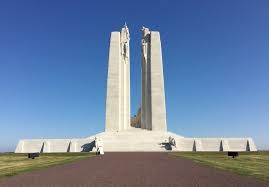As a winner of the Vimy Foundation's Beaverbrook Vimy Prize, Duchess Park secondary student Ariadne Douglas was among 16 students from Canada, the United Kingdom and France to travel to England, France and Belgium this past August.
The award allowed her to study the interwoven history of Canada, France, and Great Britain during the First and Second World Wars. And during her time overseas, she attended lectures at Oxford, visited Essex Farm in Belgium where John McCrae wrote In Flanders Fields, the Canadian National Vimy Memorial and other key sites in France and Belgium.
The Canadian Corps entered the Battle of Passchendaele on Oct. 26, 2017, and the first objectives were captured the following day. By Nov. 10, the last remaining German forces had been pushed from the ridge and the offensive was called off and victory declared. Passchendaele cost the Canadian Corps 16,404 casualties; many of the wounded left on the battlefield drowned in the mud and water before they could be rescued.
As part of the 2017 program, Douglas researched and wrote a tribute to Alexander Decoteau, a soldier who fell at Passchendaele; her Great Uncle Bill McCabe also fought at Passchendaele, and survived. Here is both that tribute and her thoughts and impressions from her visit to Juno Beach on the Normandy coast in France. It was where Canadian troops landed on D-Day, June 6, 1944, a turning point in the Second World War.
As I stood on Juno beach, after we had given a memorial to all those lost soldiers, I thought, “You gave to us, now it is time we gave back to you.”
I had with me a smooth, red pebble that I had found upon the beach. The ocean was at low tide, and great pools of water had formed along the shore. Small waves lapped up to them, but never far enough or strong enough to reach the warm puddles that lay at my feet. I bent and buried the red rock within the sand, in the hope that the sea would take it back again.
White and cream foam was etched upon the granular sand, froth upon the sleek seaweed that decorated this peaceful place. What are we doing wrong, I thought, what can we do to make people care? On the shore of Juno Beach, as I watched the rhythmic movement of the sea, I realized that there is nothing we can do. You cannot make people do what they do not care to do.
But still, 20 people stand upon this shore, commemorating the fallen, and though we are not the whole world, we can make all the difference to it. Because we care and will remind everyone else that some do –truly – care. We can keep the flame burning brightly, we can choose to never forget as we stand upon these peaceful, distant and melancholic shores.
I stared back at that great expanse of green waves and watched each one of them slowly come closer to me. They had given so much, all those soldiers, and we can’t even appreciate their sacrifice anymore. The wars are distant, faded images from the pages of a history book. Yes, they had died, but it was all so long ago, and the fight for peace has become a fight for remembrance. The wind whistled softly and all I could hear, or cared to hear, were the soft crashing of the waves before me.
I would fight for remembrance; we would all fight for remembrance and to never forget those we had lost. It was morning and slightly chilly. I turned away from the sea and walked to where the sand was smooth and free of blemishes. I dislodged the few rocks or shells that were there and, with my finger, I traced a poppy into the sand: A flower for remembrance. All around me, people were leaving their own traces upon the beach, their own commemoration. Beside my flower, I pressed my hand upon the soft surface and left its imprint for the water to wash away.
It was time to leave; high tide was coming, and if we were not quick, we would be washed away ourselves to become fresh additions to the collection the sea has ruthlessly accumulated over the years.



